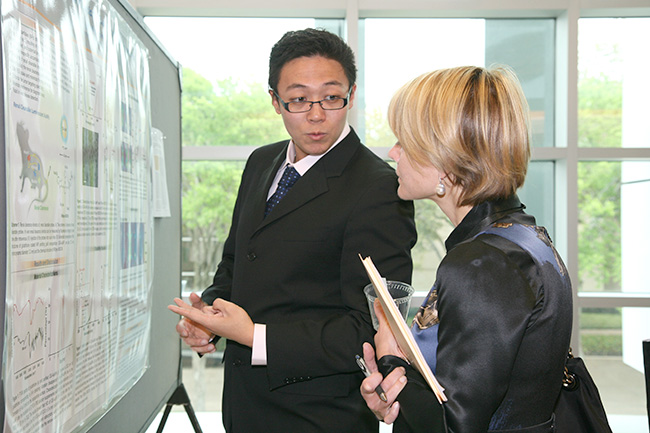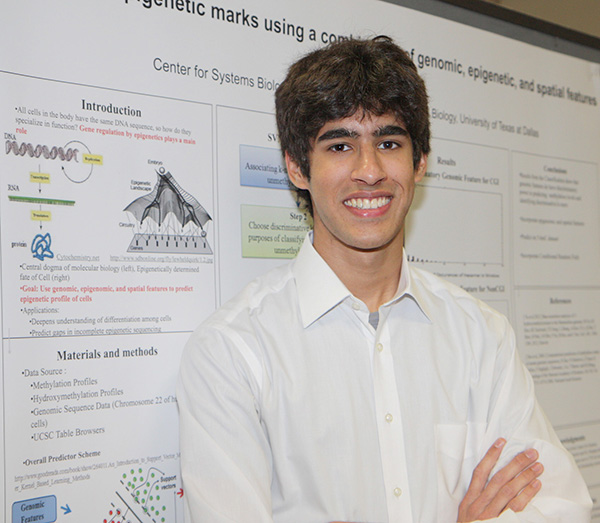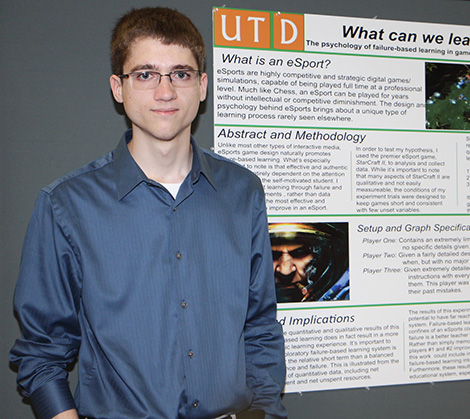
Xuhui “Louis” Ning, a senior majoring in biochemistry, won top honors for his project in bionanotechnology. Above, he spoke with volunteer judge Dr. Beth Lange, chief scientific officer for Mary Kay.
Each year, dozens of undergraduates participate in research projects at UT Dallas.
They work in areas from social sciences to physical sciences, and in emerging fields such as nanotechnology, biomedical devices and cybersecurity.
“We just want students to be involved,” said Dr. Bruce Gnade, vice president for research. “Our faculty members are very enthusiastic about having bright students to work with, and there is a wide variety of opportunities available. Students gain valuable skills and experience that make them more marketable to potential employers and graduate schools.”
The Office of Research at UT Dallas encourages students to get involved in research by providing a competitive awards program that funds student research under the guidance of faculty mentors. Last fall, in the program’s sixth year, 62 students received Undergraduate Research Scholar Awards from the research office.

Aaron Kotamarti received second place for his project that combined genetics, biochemistry and computer science.
Sixty of those student researchers displayed the results of their efforts recently in the Undergraduate Research Scholar Awards and Poster Contest held on campus as part of the Exhibition of Excellence in Undergraduate Education event, organized by the Office of Undergraduate Education. Faculty judges chose 11 finalists.
The finalists then went through a second round of evaluation by six judges from industry at the annual Undergraduate Research Poster Contest Finals, sponsored by Raytheon. The top three posters won cash awards.
Student finalists represented the School of Arts and Humanities, the Naveen Jindal School of Management, the School of Behavioral and Brain Sciences, the Erik Jonsson School of Engineering and Computer Science, and the School of Natural Sciences and Mathematics.
Xuhui “Louis” Ning, a senior majoring in biochemistry, won top honors for his project in the emerging field of bionanotechnology. Under the guidance of Dr. Jie Zheng, assistant professor of chemistry, Ning addressed the problem of tumor-targeting agents that can be toxic if they accumulate in the liver and spleen.

Brenden Palmer won third place for his work using a video game to examine the psychology of failure and how people learn.
Ning worked with a novel nanoparticle that has a gold core surrounded by a chemical agent. In laboratory tests, he compared the particle’s activity and speed of clearance from tissues to an imaging agent currently in use.
“We’ve shown that this nanoparticle clears more quickly than the clinically proven agent,” Ning said. “Since it targets tumors, it might be used for early disease detection or it might also be useful for targeted delivery of drugs.”
Aaron Kotamarti received second place for research that combines genetics, biochemistry and computer science. His faculty mentor was Dr. Michael Zhang, director of the Center for Systems Biology and the Cecil H. and Ida Green Distinguished Chair in Systems Biology Science.
Using biological principles as input, Kotamarti devised computer programs that could help researchers better understand a process called methylation, which helps regulate the expression of genes. Kotamarti has a bachelor’s degree in engineering from UT Dallas and is currently completing a bachelor’s degree in biology and a master’s degree in engineering.
Third place went to Brenden Palmer, a freshman in the School of Arts and Humanities. Dr. Monica Evans, assistant professor in the arts and technology (ATEC) program, oversaw Palmer’s project, which used a popular video game to examine the psychology of failure and how people learn. Palmer said his work has potential applications in improving training methods used in business, education and the military.
Match Day Brings
New Opportunities
During a week dedicated to undergraduate research, a new event gave undergraduate students a chance to explore and pursue opportunities to work in faculty labs.
During Match Day, which was held March 27 in the Visitor’s Center Atrium, faculty from across the University stood behind tables and booths and explained various projects to students. The event was designed to show students the variety of research projects on campus and to help faculty recruit top students to work on research projects.
“Students who participate in a research project as an undergrad will gain valuable experience that contributes to future success professionally, or in graduate school,” said Courtney Brecheen, assistant dean of Academic Excellence Scholarships and Undergraduate Programs.
Dr. Beth Lange, chief scientific officer for Mary Kay, has judged the poster competition the past couple of years and said choosing winners was difficult.
“It was even more challenging this year because everyone is at such a high caliber,” Lange said. “The students are better prepared for understanding real-world applications of their research.”
The other five judges were: Audrey Kostrzewa, engineering director, Raytheon; Dr. Austin Kozman, senior principal engineer, PepsiCo Advanced Research; Dr. Nitish Murthy (PhD 2009), software engineer, Texas Instruments; Dr. David Thomas, executive vice president for research and development, Dr Pepper Snapple Group; and Cindy O’Shea, manager, Global Solutions Center, IBM.